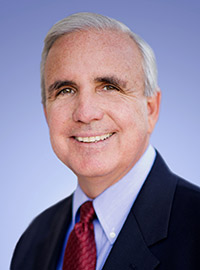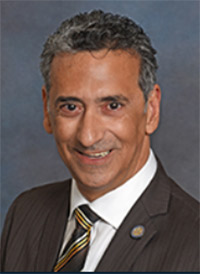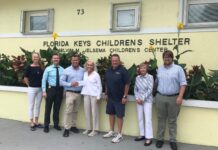A race to represent the Florida Keys and Miami-Dade County in Congress will see Republican incumbent Carlos Gimenez and five challengers. A Republican primary will be between Gimenez, Carlos Garin, of Coral Gables and K.W. Miller, of Miami. On the Democratic side, Robert Asencio, of Miami, will square off against Juan Paredes, of Miami, in the Aug. 23 primary. Winners from those races will square off in the November general election. Jeremiah Schaffer, a Sugarloaf resident, enters as a write-in candidate.
The Keys Weekly asked the candidates the following questions (candidates KW Miller and Jeremiah Schaffer didn’t provide responses in time for publication):
- What would you do to help secure federal funding for Keys communities dealing with flooding issues?
- What’s your take on FEMA’s Risk Rating 2.0, and what would you do to mitigate rising insurance costs, especially in the Keys where rates are already high?
(Answers provided by campaign)
CARLOS GARIN, 57
Republican
Actor, television host and political analyst

1.Given the importance of our district for the economy and tourism, and taking into account the real flood risk zoning of the area, which excludes it from fortuitous events due to its geography, it is imperative to manage and develop an Emerging Federal Fund Immediate Action, based on the certification as a special risk area, which allows action to be taken during climatic events and prior to them, to minimize their impact on the community. This program would be subject to the county administration, to guarantee its immediate execution prior to FEMA’s action, in coordination with the fire department and different humanitarian and territorial government organizations, minimizing the risk of human losses during the period prior to entry from FEMA after the disaster.
2. I believe that the FEMA Risk Rating Program 2.0 is good, although it does not specifically adjust to the real needs of our territory, since it is exposed to the hurricane season annually.
For this reason, certification as a Special Risk Area is essential, which allows us to manage the creation of the Emergency Federal Fund for Immediate Action, which would not only minimize the negative impact of climatic events by accelerating the recovery of the area, but would also impact positively on the cost of insurance by significantly reducing your investment.
KW MILLER, 56
Republican
Energy industry expert, chair of the America First Political Committee

KW is a global energy and Infrastructure expert. He has structured tens of billions in infrastructure, insurance and public/private partnerships. He plans to create a public/private partnership structure to underwrite/insure/restructure the antiquated traditional flood insurance. This will in essence be a new “insurance risk pool” which is unwritten/funded/administered via a new independently run entity which will bring in substantial private funding, in addition to the traditional sources. The system is broken and must be completely rebuilt.
- KW’s position is that FEMA is a complete disaster as a government entity and must be completely gutted and overhauled. The mandatory flood insurance for homeowners who have mortgages, where the lenders require the flood coverage is essentially a fraud on homeowners. The majority of Florida Keys homes will never be flooded on the living floor (second floor), as building code require new and rebuilt homes to be elevated. This results in homeowners paying for expensive flood insurance premiums which do not properly “risk adjust” for homeowners. Essentially KW’s view is the current floor insurance program is useless and must be completely overhauled via a public/private partnership structure mentioned above in the FEMA/Flooding support.
CARLOS GIMENEZ, 68
Republican
Member of Congress

1. During my time in Congress, each community project funding request submitted by my office was approved, leaving my office with a 100% track record in securing critical funding for South Florida, including important federal funding for the Florida Keys. In the last appropriations package, my office was able to secure $5.4 million for the Twin Lakes Pre-Disaster Mitigation project. Residents are often the ones who carry the largest burden during natural disasters and seasonal flooding. This important funding will help the Twin Lakes Subdivision ensure the long-term viability of the neighborhood by bolstering the subdivision’s ability to clear roads, put flood mitigation protocols in place, ensure power can be quickly restored and that residents are kept safe during episodes of flooding.
2. The NFIP currently has about 5.1 million policies in force nationwide, of which 1,727,000 NFIP policies are in Florida. For such an important program, the NFIP is in serious need of reform as it owes billions of dollars to taxpayers. Annual premiums nationally are $3.6 billion and provide $1.3 trillion in property coverage. Florida premiums are $986 million per annum, or 27.4 % of that total. This means that while overall the NFIP has lost money, Florida is a donor state to the program. Robust change is needed for it to become self-sufficient, including increasing the number of properties paying in and increasing affordability. That is why I have joined Senator John Kennedy in introducing the Flood Insurance Fairness Act in the House of Representatives, which prevents the NFIP from increasing flood insurance premiums without Congressional approval. I have cosponsored an NFIP reauthorization that:
- Caps annual premium increases
- Institutes a means tested affordability program
- Increases authorization for flood mapping by $100 million
- Gives credit to communities for making resiliency investments
ROBERT ASENCIO, 58
Democrat
Retired police officer (Captain), veteran and former state representative

1. I seek to immediately leverage the known urgent findings and recommendations of the ongoing Army Corps of Engineers – Florida Keys Vulnerability Assessment on “sea level rise” and its effect(s) to lobby Congressional leadership, membership, and the “White House” Administration for added appropriations in land and sea resilience and fortification(s.) I seek to build on the passing of H.R. 7776 and insufficient funding awarded to Monroe County, cited in Keys Weekly on March 29, 2022.
2. Per Monroe County the Risk Rating 2.0 was implemented by FEMA at the direction of Congress to move the NFIP in the direction of increased premiums, due to its debt caused by past storm events. To start, I will advocate for the Monroe County recommendations to increase CRS discounts and added federal funding to increase land and structural elevation. I will pursue negotiation of legislation to cap allowable increases under current limits — preferably under 10% as recommended by Monroe County.
JUAN PAREDES, 28
Democrat
SEO technical expert

1. The primary issue is flooding maps being drawn using outdated information back to the 1980s. The NFIP needs to increase the funding pool by properly designating high-risk areas to secure proper funding.
2. FEMA’s Risk Rating 2.0 uses more modern science, but I will ensure that flood zones do not have problematic disparities. Appropriate funding pools and accurate risk assessments will mitigate insurance costs.























